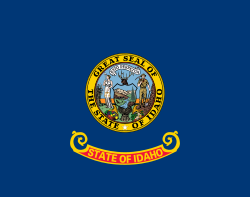
This is a list of law enforcement agencies in the U.S. state of Idaho.
Contents
According to the US Bureau of Justice Statistics' 2008 Census of State and Local Law Enforcement Agencies, the state had 117 law enforcement agencies employing 3,146 sworn police officers, about 206 for each 100,000 residents. [1]